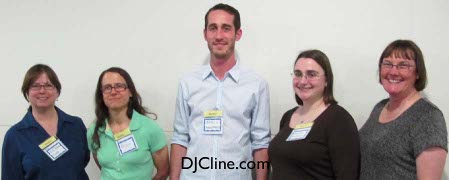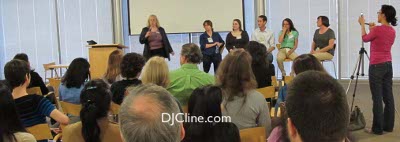About a month ago I was contacted by Sonja London, Chair of SDForum Tech Women, and asked if I was interested in being in a panel to introduce and discuss Open Source involvement with the Tech Women group. I was delighted at the opportunity!

The panel came together and ended up featuring Cat Allman of Google’s Open Source Programs Office, Alison Chaiken of MeeGo, Beau Lebens of WordPress, and was moderated by Janet Fouts of Tatu Digital Media. It was truly an impressive panel and it was quite an honor to be part of it. We had a conference call the week to prepare but otherwise Alison was the only person I’d met in person prior to the event.
So last Thursday I took Caltrain down with Grant Bowman, who I had invited along, and MJ picked us up at the train station. We arrived at Symantec around 6PM and were treated to some great snacks provided by the site host and given the opportunity to network with women attending the event. At 7PM the panel began!

Janet was a great moderator and I quickly learned that I’m a big fan of the panel format as a presenter. The universal nervousness that accompanies a formal solo presentation wasn’t there and with a good panel the panelists really play off each others comments in a productive way, which is precisely what I experienced. Janet asked us questions about our involvement ranging from what our own definition and feelings around open source were to how we think mentoring programs play a role in expanding development. The questions from the audience were also really great, one person asking where the money in FOSS was – which I couldn’t help but answer with one of my most recent realizations: I totally take for granted my ability to learn how to handle complex virtual machine infrastructures by tossing up as many Debian installs as I want. No licensing concerns! So while my panelists covered the standard points of how there is money in FOSS I went down the “what you don’t have to pay for” path.

The event did get me thinking a lot about how FOSS projects go about testing. Testing is a HUGE thing in the Ubuntu community. We have events around doing testing, a whole infrastructure around iso testing and always the encouragement for members of the community to test Alphas, Betas, and submit bug reports. However, a lot of projects don’t do this very well. A vast majority I’ve been involved with require you to be able enough to install the software from a revision control system and compile it yourself, and this doesn’t fit your average user who either installs their software from a simple package manager, or end user of a web application who may never have to handle installation at all. I think projects would really benefit from making this easier, there are a lot of folks who are willing to do software testing as a way to get involved and have expertise in the market their software targets but who are overwhelmed by the technical steps involved. I think I’ll do some experiments.

